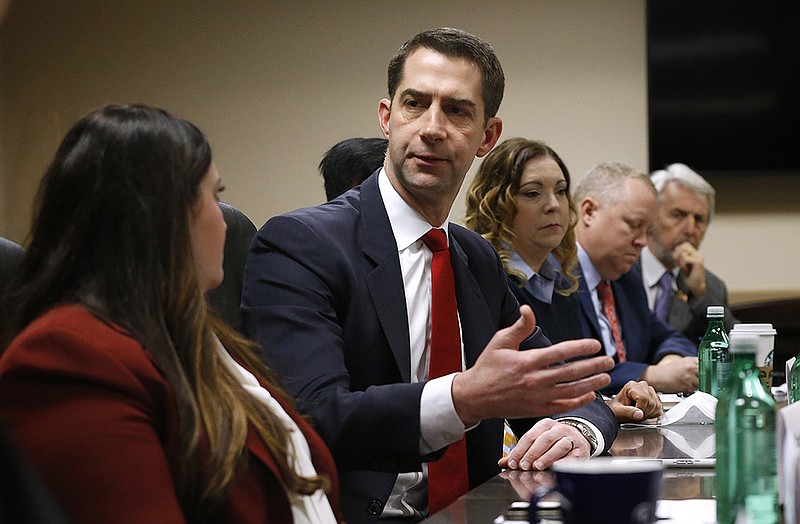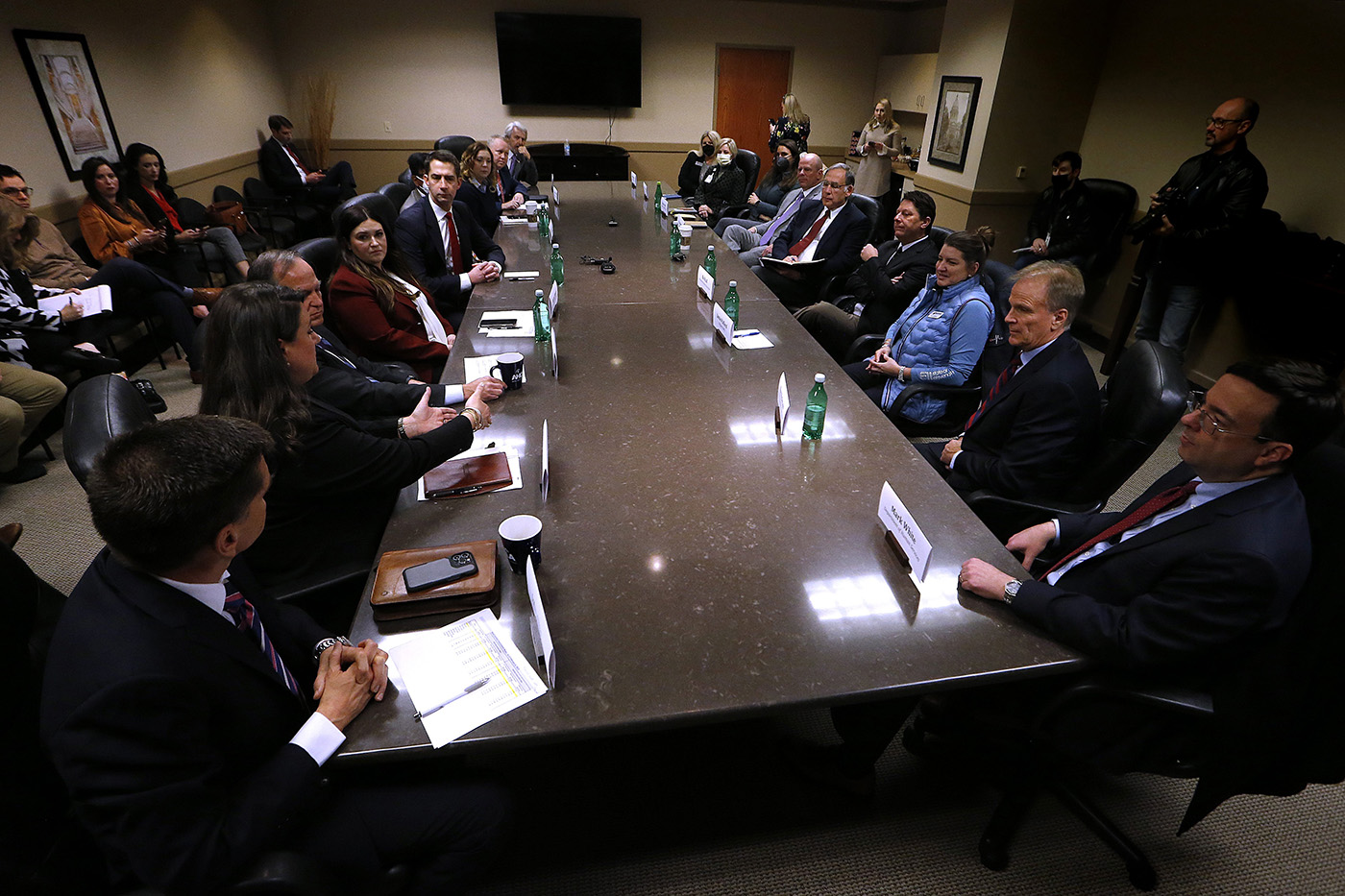Arkansas' hospitals are understaffed, its nursing homes are burdened by covid regulations and health care providers are in dire need of federal assistance, a group of state health leaders told U.S. Sens. John Boozman and Tom Cotton on Wednesday.
Officials representing Arkansas' hospitals, nursing homes, ambulance services and pharmacies told the Republican senators that the covid-19 pandemic has put a strain on the state's health system.
Boozman and Cotton's offices jointly organized the event Wednesday in Little Rock as a listening session to take a measure of the state's health care system.
Health care leaders at the meeting gave the senators a grim outlook, saying they need more federal funds to keep up with the rising costs associated with the pandemic.
"Our staff is bruised, beaten," said Ron Peterson, president and chief executive officer of Baxter Regional Healthcare System. "Our staff sees a light at the end of the tunnel, they believe it's a train."
Peterson said there are 26 openings at his hospital, and it has hired 53 traveling nurses, paying each between $150 to $180 per hour. Despite offering wages to staffs and increasing the minimum wage from $11 per hour to $15 per hour.
The Coronavirus Aid, Relief, and Economic Security (CARES) Act, which Congress approved in 2020, provided billions in relief funds for health care providers. Peterson told the senators his hospital could use "one more punch from the provider relief funds."
Bo Ryall, president and CEO of the Arkansas Hospital Association, told Boozman and Cotton that Congress needs to "replenish" the health care provider relief fund and delay scheduled cuts to Medicare.
Jamie Pafford, CEO of Pafford Medical Services, said the ambulance industry is hurting from a lack of paramedics and federal pandemic funds.
"We are in a crisis across the nation, especially in Arkansas," Pafford said.
Fewer than 42% of licensed paramedics in Arkansas are active, Pafford said, adding that many paramedics have been poached by hospitals as the hospitals look to make up for their staff shortages.
"We had slim pickings before the pandemic, and now it's just exasperated," she said.
Boozman said inflation and supply chain issues are to blame for some of the stress on health care providers, while Cotton placed blame on federal regulations implemented during the pandemic.
"We heard a lot about the administrative burdens they all face because of excessive regulations," Cotton said. "Or the need, now that we're in a much later phase of this pandemic to reassess some of the early protocols."
Cotton said in the short-term there is still funding for health care providers left from the CARES Act, but Congress should change the "legal authority" to allow ambulance services more access to federal funds.
Cotton asked Peterson about staffing shortages, wondering what reasons employees gave for leaving. Peterson said higher pay and burnout were the main reasons it was hard to retain staffing.
Marcy Doderer, president and CEO of Arkansas Children's Hospital, said covid-19 has upended the health care system with a dramatic increase in salaries. Doderer said Arkansas Children's Hospital's cost structure increased by $40 million from 2019-21.
"If covid stopped tomorrow and there wasn't another single positive case and every regulation went away on how to take care of a covid patient, we are left with a cost structure that is forever embedded in our system."
Doderer said agencies that contract out traveling nurses have "raised their rates astronomically." Doderer said it is hard for hospitals to recruit nurses when the pay for traveling nurses is much higher.
"They can go and take a traveler contract and for three, or four or for five months and pay off their student debt," Doderer said.
Terry Fiddler, of the Arkansas State Dental Association, said the high cost of dental and medical school is contributing to the labor shortage in medicine.
"They're coming out of these medical, dental and pharmacy schools with $250,000 to $400,000 in debt," Fiddler said.
Last week, Boozman along with Sen. Jacky Rosen, D-Nev., introduced a bill that they said would give medical and dental students a break by pausing payments on principal loans and interest while they complete their internships and residences.
"We hear about the rancor in Congress, but these are bipartisan efforts," Boozman said. "You know, these are things that both sides are very interested in."
The bill called the Resident Education Deferred Interest Act could allow doctors and nurses to work in rural areas, where pay is lower and staffing shortages are greater.
"You kind of get your finances back under control, and then you go to work," Boozman said. "And, you know, these are specialized people, they're going to make a good salary."
Halie Schaffer, an advanced practice nurse from Greenhurst Nursing Center, said federal covid-19 regulations have put a strain on nursing home staffers and residents. Under federal regulations, nursing home patients who test positive for covid-19 have to be isolated for 10-21 days, Schaffer said.
"Somebody who is 90-year-old and has dementia, it's not helping them," Schaffer said.

